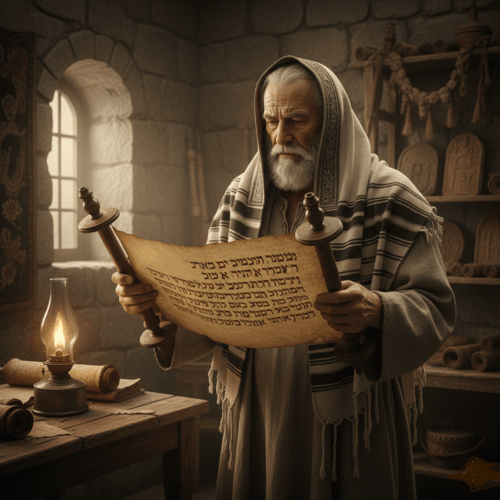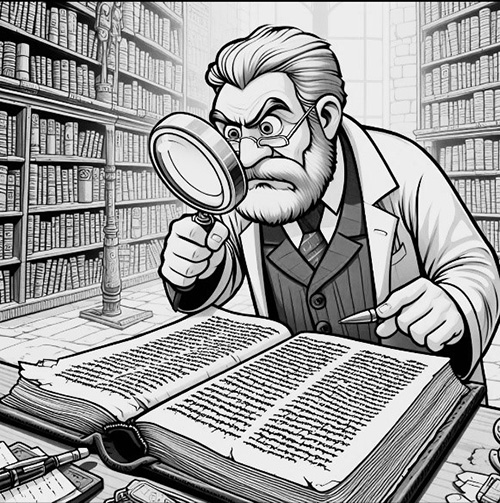How Did Jews Know the Old Testament Canon Before Rome Did?
When Jesus debated the Pharisees, He constantly appealed to Scripture. “Have you not read?” He asked repeatedly (Matthew 12:3, 5; 19:4). The question assumes something crucial: His opponents knew exactly which books counted as God’s Word. But how? The Catholic Church didn’t define the canon—the official list of biblical books—until the Council of Trent in 1546. So how did first-century Jews recognise the Old Testament as Scripture more than 1,500 years before Rome spoke?
This isn’t just a historical curiosity. Catholic apologists argue that without an infallible Church authority, nobody can know for certain which books belong in the Bible. If that’s true, sola scriptura—the Protestant principle that Scripture alone is our final authority—collapses before it begins. But the Jewish recognition of the Old Testament canon tells a different story.
WHY THIS QUESTION MATTERS (BUT NOT FOR REASONS OFTEN CITED)
First, we need to establish something fundamental: God’s Word possesses authority whether anyone recognises it or not. The canon—the list of books that are actually Scripture—doesn’t depend on human recognition any more than the sun depends on our acknowledgement to shine. Scripture’s authority is intrinsic, flowing from God’s inspiration, and isn’t derived from church councils or human consensus.
So why ask how Jews knew the canon? Not to “prove” Scripture is God’s Word—that would be backwards, placing human judgement over divine revelation. Rather, we’re demonstrating God did equip His people to recognise what He’d given them. This has value apologetically (in answering sceptics), pastorally (to confirm God doesn’t hide His Word from His children), and historically (to show the Catholic argument is anachronistic).
THE HISTORICAL EVIDENCE: JEWS RECOGNISED A FIXED CANON
The evidence is remarkably clear. When Jesus referenced “the Law of Moses, the Prophets, and the Psalms” (Luke 24:44), He was describing the threefold division of the Hebrew Bible that Jews already recognised: the Torah (Law), Nevi’im (Prophets), and Ketuvim (Writings)—collectively called the Tanakh. This structure appears as early as 132 BC in the prologue to the book of Sirach, where the translator mentions “the Law and the Prophets and the other books of our ancestors.”
First-century Jewish historian Josephus provides explicit testimony. Writing around AD 94 in Against Apion, he states the Jews possessed exactly 22 books (the same as our 39, just counted differently), that these were written by prophets, and that “no one has dared to add to them, to remove anything from them, or to alter them.” This wasn’t a new development—Josephus describes a long-established consensus.
Jesus Himself confirmed these boundaries. When He said “from the blood of Abel to the blood of Zechariah” (Luke 11:51), He was referencing the first and last martyrs in the Hebrew canonical order—from Genesis to Chronicles. This assumes His hearers understood the scope and sequence of Scripture.
Notably, while disputes existed about whether the Apocrypha—books like 1-2 Maccabees and Sirach—belong in the canon, there was no debate among Palestinian Jews about the 39 books that comprise our Old Testament. The Dead Sea Scrolls, discovered in the mid-20th century, confirm this collection’s special status in Second Temple Judaism.
HOW DID THEY KNOW? THE REFORMED ANSWER
So how did Jews recognise these specific books as God-breathed Scripture? Reformed scholarship, particularly the work of Michael Kruger, identifies three interwoven factors.
- Scripture is self-authenticating. Just as 2 Timothy 3:16 teaches that “all Scripture is God-breathed,” the Word of God bears its own divine qualities—qualities that make it recognisable to God’s people. The church doesn’t grant authority to Scripture; rather, it recognises and receives what God has already authenticated. As the Reformers insisted, we recognise the sun by its own light, not by lighting a candle to examine it.
- God gave His Word through covenantal reception. Romans 3:2 says the Jews were “entrusted with the oracles of God.” When Moses received the Law, when David wrote psalms, when prophets spoke, their words carried recognised divine authority in their own time. The community’s recognition was immediate and organic, not something requiring institutional declaration centuries later. The prophetic office itself provided the authentication mechanism.
- God’s providential preservation ensured His Word endured. He worked through His covenant people—not perfect people, but through a faithful process—to preserve and transmit His revelation across generations. This corporate reception provided ongoing confirmation of what God had given.
ANSWERING THE CATHOLIC OBJECTION
Catholic apologists respond: “Without an infallible Church authority, you cannot have certainty about which books are Scripture. This defeats Protestant sola scriptura.”
But this argument proves self-defeating. As James White points out, if we need an infallible authority to identify Scripture, we’d need another infallible authority to identify that infallible authority—an infinite regress. Catholics must themselves make a fallible judgement that Rome is infallible. They face the same epistemological situation they claim defeats Protestantism.
More tellingly, Jesus assumed the Jews knew Scripture’s boundaries. He rebuked Jewish traditions that contradicted Scripture (Mark 7:9-13) but never corrected their understanding of which books were Scripture. His constant appeals—”Have you not read?”—make no sense if Jews needed future Church councils to know what to read.
Michael Kruger helpfully distinguishes two different questions here. The ontological question asks: What makes something Scripture? Answer: God’s inspiration. The epistemological question asks: How do we know what’s Scripture? Answer: the Spirit’s enablement of His people to recognise God’s voice. Catholics conflate these questions, assuming that any uncertainty about how we know must mean uncertainty about what is Scripture. But Jesus taught that God’s sheep hear His voice (John 10:27)—and that recognition is sufficient.
Even the Apocrypha issue supports the Protestant case. Palestinian Jews rejected these books. Early church fathers like Jerome, a Catholic saint, acknowledged the superiority of the Hebrew canon. The church debated the Apocrypha precisely because the Jews had rejected them.
CONCLUSION
So yes, Jews knew the Old Testament canon through immediate covenantal recognition—God’s self-authenticating Word given through recognised prophets to His covenant people. No magisterium was necessary then. And none is necessary now.
This demonstrates the viability of the Protestant position. Our confidence ultimately rests not in our ability to prove the canon through historical argumentation, but in God’s ability and faithfulness to communicate clearly with His people. The same God who preserved His Word for ancient Israel preserves it for us today. He doesn’t play hide-and-seek with His children. He speaks, and His sheep hear and recognise His voice. Period.
RELATED FAQs
What about the Council of Jamnia? Didn’t Jews officially close the canon around AD 90? The Council of Jamnia theory has been largely debunked by modern scholarship. Roger Beckwith’s comprehensive work The Old Testament Canon of the New Testament Church demonstrates there was no formal council that “closed” the canon. What occurred at Jamnia (Yavneh) were rabbinic discussions about books already universally recognised, not a canonical decision-making process. The canon was already established and received long before AD 90—Jamnia simply reflected ongoing Jewish consensus about books they’d already been treating as Scripture for centuries.
- Did the early church fathers disagree about the Old Testament canon? Yes, and this actually supports the Protestant position. Church fathers like Origen, Athanasius, Jerome, and Rufinus consistently distinguished between the Hebrew canon (our 39 books) and the additional Apocryphal books found in the Greek Septuagint. Jerome particularly argued for the “Hebrew truth” and placed Apocryphal books in a secondary category useful for edification but not for establishing doctrine. As FF Bruce noted in The Canon of Scripture, the early church’s debates centred on whether to include books beyond the Jewish canon—the Jewish canon itself was never in question. The disagreement was about adding to what Jews recognised, not about what Jews recognised.
- What’s the difference between “canon” and “Scripture”? This distinction, emphasised by scholars like Herman Ridderbos, is crucial. “Scripture” refers to the actual writings God inspired—these were Scripture the moment God breathed them out. “Canon” refers to the list or collection of books the church recognises as Scripture. So Genesis was Scripture when Moses wrote it, but the “canon” is our recognition and collection of all the books God inspired. This means the canon-recognition process is descriptive (acknowledging what is), not prescriptive (making something become Scripture). God created Scripture; the church discovered and received it.
How does the “internal testimony of the Holy Spirit” relate to canon recognition? John Calvin famously argued the Holy Spirit provides an internal testimony that authenticates Scripture to believers. This doesn’t mean subjective feelings determine canon, but rather that the same Spirit who inspired Scripture enables God’s people to recognise His voice in it. As Calvin wrote in Institutes (1.7.4-5), Scripture is “self-authenticated” and the Spirit’s testimony provides believers with certainty beyond human argumentation. This explains how the church collectively recognised the canon—not through naked reason or institutional declaration, but through Spirit-enabled discernment of God’s Word.
- What role did the Septuagint play in canon confusion? The Septuagint (LXX) was a Greek translation of the Hebrew Scriptures made around 250-150 BC, and it included Apocryphal books not in the Hebrew canon. Because many early Christians used the LXX, some initially treated these additional books with high regard. However, as scholar Roger Nicole points out, using a translation that contains extra books doesn’t mean endorsing those books as canonical—it’s simply using the available translation. Significantly, when the New Testament quotes the Old Testament over 300 times, it never quotes from the Apocrypha as Scripture, even though those books were available in the LXX. This shows the apostles maintained the Hebrew canonical boundaries.
- Doesn’t 2 Maccabees 15:9 show the Apocrypha was considered Scripture? This is a common Catholic argument—that since 2 Maccabees refers to “the holy book,” it demonstrates canonical self-awareness. However, as James White explains, this reasoning is circular: it uses a disputed book to prove itself canonical. More importantly, 2 Maccabees itself contains historical errors and theological problems that Reformed scholars identify as inconsistent with divine inspiration (like prayers for the dead in 12:45). The book also ends with a humble statement (15:37-38) where the author hopes his work pleases readers—quite different from prophetic “Thus says the Lord” declarations. A book claiming to be useful or holy doesn’t make it God-breathed Scripture.
How can Protestants be confident about the canon without an infallible church? Reformed epistemologist Alvin Plantinga’s work on warranted Christian belief helps here. We can have knowledge without absolute proof or infallible authority. Just as we know our parents love us without an infallible authority certifying it, we can know Scripture through the proper functioning of our cognitive faculties under the Spirit’s guidance. Michael Kruger adds the “self-authenticating” model provides the same kind of assurance Catholics claim for their magisterium—except it’s grounded in God’s direct testimony through His Word rather than human institutions. As BB Warfield argued, confidence in Scripture rests on its divine origin, not on the church’s declaration. God’s ability to reveal Himself clearly is more certain than any human institution’s claims to infallibility.
OUR RELATED POSTS
Editor's Pick

GPS Without Eyes: How Ants Silently Shout Intelligent Design
Picture a leafcutter ant navigating the rainforest floor in pitch darkness, carrying a leaf fragment 50 times its body weight. [...]

Born Broken: Why Must We Affirm Original Sin?
Imagine a world where we’re born neutral—free to choose good, and without a bias toward evil. Sounds appealing… until we [...]

Does God Truly Care About My Everyday Choices?
OWe believe God created the universe. We believe He orchestrated the exodus from Egypt and raised Jesus from the dead. [...]
SUPPORT US:
Feel the Holy Spirit's gentle nudge to partner with us?
Donate Online:
Account Name: TRUTHS TO DIE FOR FOUNDATION
Account Number: 10243565459
Bank IFSC: IDFB0043391
Bank Name: IDFC FIRST BANK






